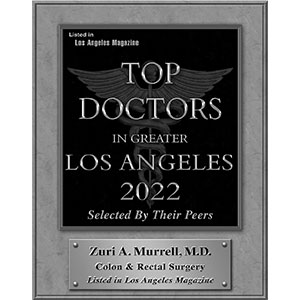Crohn’s disease is an inflammatory bowel disease (IBD). The condition causes the lining of the digestive tract to become inflamed leading to abdominal pain, severe diarrhea and in some cases malnutrition.
Don't Wait, Reach Out For Help
Inflammation affects the layers of the patient’s bowel tissue. The painful, sometimes debilitating condition can have life-threatening complications for some patients. If you or a loved one is experiences symptoms related to Crohn's disease, it is best to reach out to an experienced Los Angeles colorectal surgeon like Dr. Zuri Murrell as soon as possible.
There is no cure for Crohn’s disease, however Dr. Murrell is able to deliver Crohn's disease treatment in the form of IBD treatment, which will reduce the symptoms of the condition and possibly even cause a remission. A colonoscopy is a typical exam Dr. Murrell typically provides to further examine the signs and symptoms related to Crohn's disease.
Signs and Symptoms of Crohn's Disease:
- Diarrhea – This common Crohn’s symptom develops because the intestines produce large amounts of water and salt. These excess fluids are not able to be absorbed by the colon and result in loose stools.
- Cramping and Abdominal pain – As the bowel becomes inflamed and ulcerated, it can swell and over time develop thickened scar tissue, this can affect the digestive tract and lead to pain and abdominal cramps. Intestinal cramping can be moderate to severe.
- Bloody stools – As food is digested, the process may cause inflammation and bleeding in the digestive tract. Patients may notice blood within or a darker discoloration of their stools.
- Ulcers – The condition may cause sores to form on the intestine that, over time, can develop into larger ulcers that may penetrate the walls of the intestine causing perforations.
Some Risk Factors for Crohn's Disease May Include:
- Age - Crohn's disease can develop at any age, but is more common in younger patients, with the condition often being diagnosed before the age of 30.
- Ethnicity – This condition can affect any ethnicity. While it is more prevalent in whites and those of Eastern European Jewish descent, it is being diagnosed with increasing frequency in the African American, and Latino communities.
- Family history – The risk for developing Crohn’s is higher if a sibling, parent or child has the disease.
- Smoking – Cigarettes can cause the disease to be more severe in nature.

Symptoms of Crohn's Disease
While many symptoms of Crohn's disease can be managed by Gastroenterologists, Dr. Murrell can help treat and control the complications of Crohn's disease. Symptoms include:
- Bowel obstructions – As the disease develops the intestinal wall may thicken and narrow, requiring surgery to treat the affected areas.
- Ulcers – Chronic inflammation of the digestive tract can lead to ulcers in the intestine as well as in the anus and genital area.
- Anal Fistulas – At times, ulcers can perforate the intestinal wall causing an abnormal connection with other organs or even the skin. Left untreated, these fistulas can become life threatening.
- Anal fissures – cracks or clefts in or around the anus may develop infections and cause painful bowel movements and also can lead to perianal fistulas.









